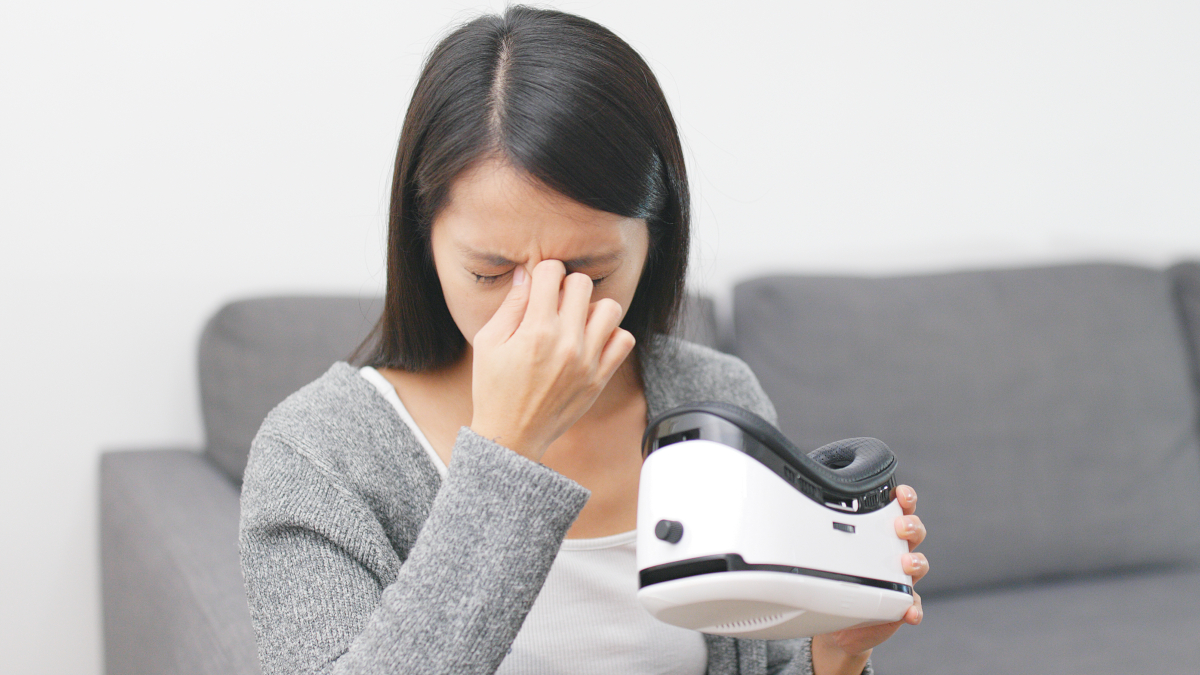#Is VR Bad for Your Eyes?

Table of Contents
“#Is VR Bad for Your Eyes?”

Does strapping a screen over your eyes and then blasting photons at them for hours cause damage? Moms always said sitting close to the TV is a bad idea, but is there evidence that VR is bad for your eyes?
Motion Sickness and VR
People do get sick in VR from something known as motion sickness. Individual people have different levels of sensitivity to it, but it usually happens because motion information from your eyes disagrees with those from your other senses. That disorientation can make you feel nausea and unstable on your feet.
A large part of modern VR development has been about making motion sickness a non-issue. Modern VR headsets and the computers that drive them to offer extremely low-latency visuals. Usually less than 20 milliseconds from where you move to where your eyes see that movement in VR. That said, it’s important not to confuse VR-induced motion sickness with eye problems that are purportedly caused by VR.
What’s the Evidence for Eye Problems From VR?
In 2020, a VR developer named Dani Bittman posted a story to Twitter claiming that extended VR use may have damaged their eyesight. The BBC reported on this claim, interviewing a representative from the Association of Optometrists who reiterated that there’s currently no evidence that VR headsets cause permanent damage to eyesight. Just the same type of transient eyestrain that all computer screens cause when we focus on them for too long.
That doesn’t mean it’s not possible. It just means that the right studies haven’t been done yet and not enough time has passed to gather data. In the absence of evidence, it’s important not to fill the blanks with assumptions!
VR Can (Potentially) Be a Problem for Children

VR headset makers generally advise that young children should not use their headsets and you’ll find that most optometrist associations echo that warning. This isn’t because there’s something particularly harmful about VR, but that kids are still developing and that includes the development of their visual systems.
There’s currently no consensus among experts on what the age limit should be for VR and there’s no evidence that it definitely causes harm. This is for the same reason we don’t really know the long-term effect of VR in adults—there hasn’t been enough time to collect data. When Scientific American raised the issue of needing data to help understand VR’s potential effects on child eyesight, headsets like the Oculus Rift and HTC Vive were brand new.
At the time of writing, six years have passed, barely enough time for a VR-using child to have moved into adolescence. It’s also not ethical to subject children to prolonged VR use for research purposes. That means researchers have to rely on self-reporting from children who choose to use VR for long periods of time and study whether this has a systemic effect on eyesight. Of course, if parents take preemptive warnings to keep VR headsets away from their kids seriously, that data will be hard to come by.
Calibration Is Important!
As a rule of thumb, anything that strains your eyes is going to be bad for them. Regular non-VR screens can lead to eyestrain because we blink less, use them at the wrong distances, don’t adjust the contrast properly, or they have glare on them. Eyestrain generally doesn’t have serious consequences if you let your eyes rest, but that doesn’t make it comfortable to experience.
If your VR headset is set up properly, there’s no inherent reason why it should cause general eyestrain. Make sure to measure your IPD (interpupillary distance) and adjust your headset accordingly. You should also adjust your headset so that text and objects in VR are in sharp focus. If you need corrective lenses, either use a headset that allows them or have custom lenses made.
What Should You Do?
In general, anything you do to excess is bound to have negative effects on you, whether that’s working too hard, eating too much, or spending eight hours a day playing Beat Saber on your Quest 2. The most practical thing to do is see a medical professional as soon as you realize something is wrong with your vision. The exact cause is less important than getting the problem fixed early. It’s good practice to get annual eye tests anyway, so make your next booking now and keep enjoying your VR headset.
If you liked the article, do not forget to share it with your friends. Follow us on Google News too, click on the star and choose us from your favorites.
For forums sites go to Forum.BuradaBiliyorum.Com
If you want to read more like this article, you can visit our Technology category.



